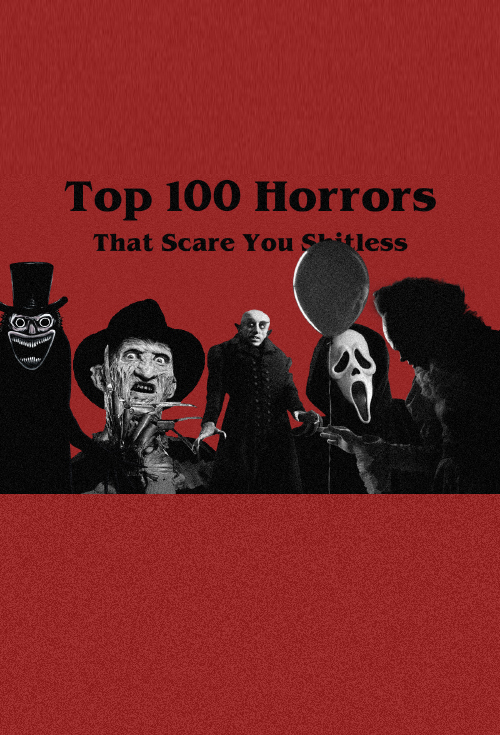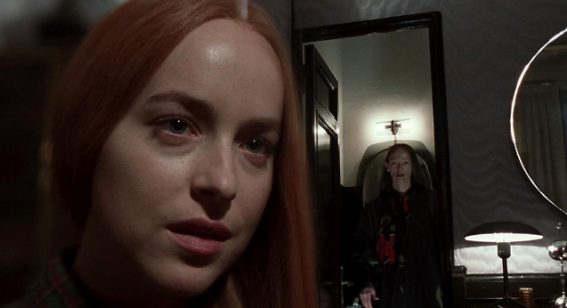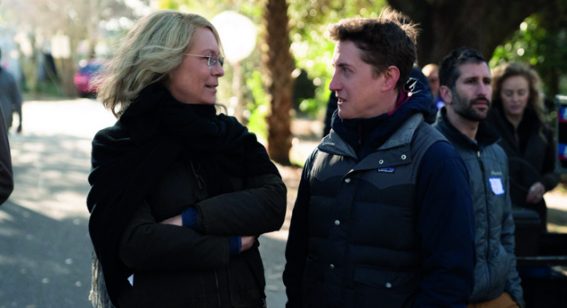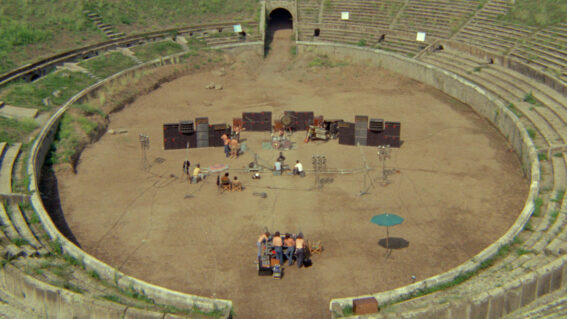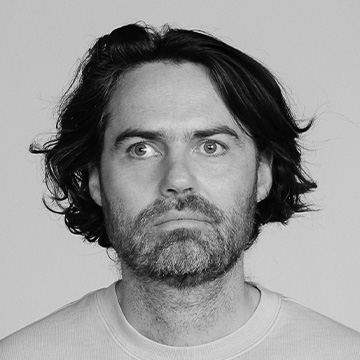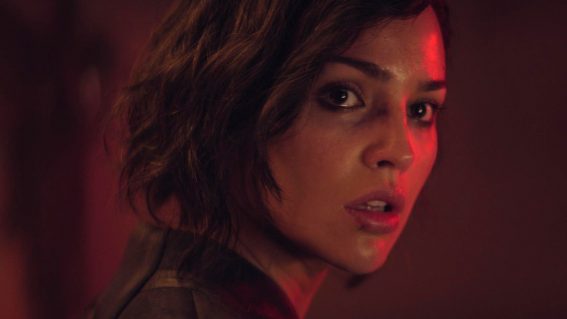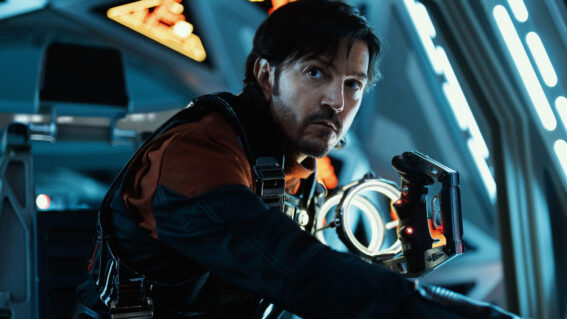Horror super-producer Jason Blum on new Halloween, John Carpenter & scary shit
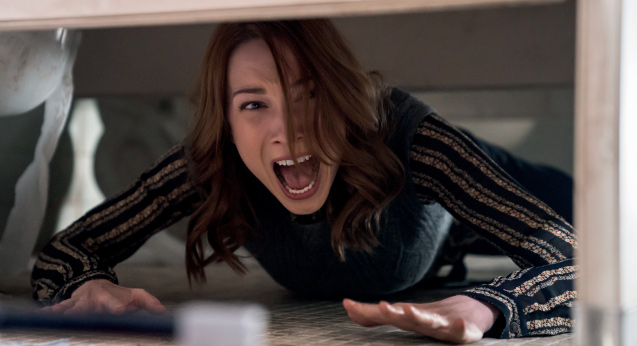
If you’ve watched horror movies made in the last decade, chances are you’ve seen a film produced by Jason Blum. His company Blumhouse Productions is probably best-known for incredibly successful low-budget films like Paranormal Activity, Insidious, The Purge and their sequels, just some of 80-plus films released in little more than a decade—also including Best Picture Oscar nominees Whiplash and Get Out alongside the likes of Sinister, Upgrade, Happy Death Day (and possible awards season underdog BlacKkKlansman).
Somehow among this insane workload, Blum had time to talk to us about the new Halloween, a film which sees David Gordon Green direct iconic slasher Michael Myers’ return to the screen from a screenplay he wrote with Danny McBride. Ignoring the franchise’s sequels, their take on Halloween picks up 40 years after the original’s masked murders, and culminates in “one of the more memorable climaxes in modern horror” we say in our 4-star review.
Blum talked all things Halloween with Steve Newall, including the impact of the legendary John Carpenter’s involvement with the project.
FLICKS: Did you have an eye on the rights when the clock was ticking for Dimension [who lost the rights to Halloween in 2015]? Is that how far back you were thinking about getting involved with this franchise?
JASON BLUM: Yeah, I really did. I had been thinking about for a long time and talking to Miramax, which is who they [the rights] reverted to for a long time. And the answer is yes.
What happened when you first really got to step on the gas with trying to do something with Halloween?
Oh, what happened when I took over? Well, the first thing, I went to Miramax. I said we weren’t going to do the movie unless we had John Carpenter, so they said they’d talked to John. He didn’t want to do it and I said, “You know what? Let me give it a shot.” So the first thing I did was to go sit down with John and see if I could cajole him into joining us on this adventure.
He was pretty reluctant to do it, but then finally I said, “Look, John, they’re going to make this movie and I’m not going to do it if you don’t do it. So they’re either going to make it with us or without us. Instead of complaining about how bad the sequels have been, why don’t you get your hands dirty with me and try and make a good one?” And I think that was compelling enough that he joined us.
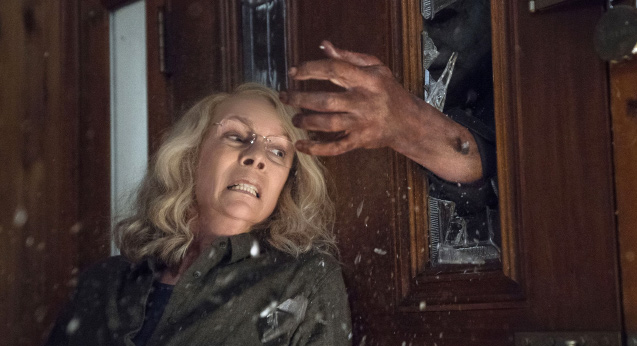
Could he relate to the kind of films that you had been making? A large proportion of those are supporting directors with very clear visions on relatively small budgets. Did that put you at an advantage with dealing with him, do you think, as opposed to, I don’t know, some of the studios that may have dealt with him in years previously?
No. It’s a good question. He didn’t really know much about our process, so he came to appreciate that over time. I just actually did a bunch of press with him a couple weeks ago and we talked about that. At the time, he just knew that we were a production company attached to a bunch of successful movies, and to tell you the truth, I don’t think that helped or hurt my case.
But over the course of the process of making the movie, he came to understand a lot better how we work, that we work with unconventional directors for horror, like David Gordon Green, that we give them more creative control than they typically get in Hollywood like we did with David and Danny. And he came to really appreciate it, but I don’t think he knew that much about it going in.
As I understand it, one of the next steps was for you to solicit some pitches, get people in front of John. Is that how it went?
Yeah, that’s exactly right. After we got John, then it was time to find a writer/director. I’ve had much more luck with writer/directors than just finding the writer. So I really was looking for someone who would write/direct it really, not just write. And we did have a couple of conversations with a few different people, but we finally landed on David and Danny. And boy, I’m glad we did because I think the movie just wouldn’t have been as good without them, for sure.
What are some of the challenges with bringing Michael Myers back to the screen in 2018? You know, we’re in a very different landscape to the one he first emerged in.
Well, for Blumhouse, for our company, we really focus on low-budget movies, and we do that because it reduces the noise and it reduces the number of people involved. So with this movie, one of the challenges for us was how to go into a family that’s existed with a lot of different opinions, and so that was, from a corporate point of view, that was a challenge.
On a thematic point of view, which I think is more your question, the challenge is how do you make Michael Myers relevant today? How do you make Halloween relevant today? And I really do believe that David and Danny came up with this concept of, what would it be like to look at a traumatic event 40 years later? Whereas most horror movies that you see are actually about the event, this is about the aftermath of that event. And then clearly there’s new trauma that happens in the movie, but first and foremost this movie’s about what happens 40 years after this awful thing.
That was something new to explore, and I also think it’s a triumph of three generations of women working together to defeat the most evil man in the world, and that too made our new Halloween a very contemporary-feeling movie.
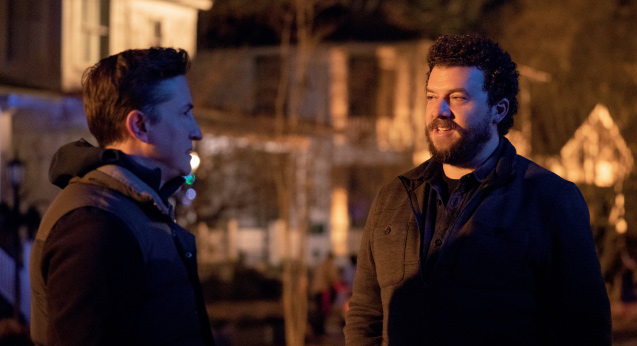
I was reading a story in which David Gordon Green talked about the idea of restaging the ending of the first Halloween and being talked out of doing that by John Carpenter who, as the story recounted, anyway, urged him to trust the audience and their ability to go along with what story he was trying to tell. Were there things like that that Carpenter contributed that really made a difference to the finished film?
There were. He did contribute that specifically, but I think there was something much more profound that he contributed, which is that once he agreed to do it, his presence loomed over every decision even if he wasn’t involved in every decision. And what I mean by that is that we weren’t going to do anything creatively that he didn’t like.
It was certainly in the back of my mind, it was certainly in the back of David and Danny’s minds. And I think that really helped shape the movie much more than John maybe is aware of, or certainly admits to, that just by the fact that he was an executive producer of the movie… he didn’t have to do anything, although he did at key decision points along the way.
The one you just mentioned, whether or not we should hire David and Danny, whether or not it was a good idea to jump 40 years in the story. He was involved in all those things, but he was really involved in everything, just by way of being the executive producer of the movie.
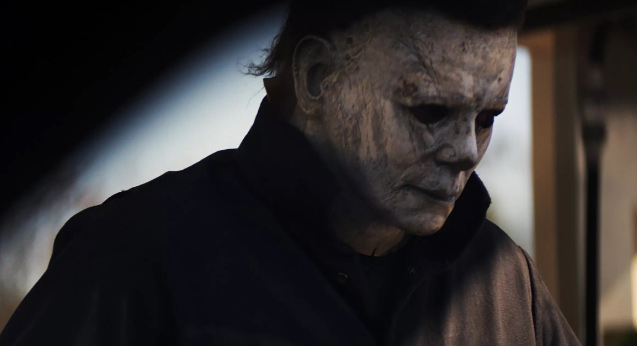
It seems to me, that may be a very different situation to one that you were used to dealing with as a producer, definitely for Danny and David, right?
Yeah, very different. I mean, in some ways different and some ways not because one of the things that we do, which is unusual in Hollywood, is that when we have a successful horror movie, we share the profits of the next movies enough to keep the creators involved. So Oren Peli did all the Paranormal Activity; there was James and Leigh—James Wan and Leigh Whannell did all the Insidious movies; James DeMonoco does all the Purge movies. And so it did feel familiar to have the creator of Halloween involved in this movie.
I think more so than ever, where you launch a film, where you first play it to an audience is more important than it perhaps has ever been. How was the Toronto International Film Festival that launching pad for you, and why was it so important to get a film like this in front of the right audience first?
Well, I believe the best way to sell a movie is the movie, right? The best way, instead of saying the movie’s great, show the movie and then just let the people decide if the movie’s great, right? And, actually, I think that if you’re not really willing to do that with a movie, you should really think about whether or not you should release it or not.
Luckily I have great partners at Universal and we kind of see eye-to-eye on this stuff, and when we did the movie, the fans are so engaged with Halloween, it just seemed like a cheat to say, “We’re not going to show it until the day it comes out.” And it also seemed like it would kind of telegraph that we weren’t proud of what we did, and I’m really, really proud of the movie, and so I wanted to show it early.
I’m really glad that we chose Toronto, it was kind of the perfect place to do it, and then followed it up with Fantastic Fest. And I thought that conversations like this would be much easier if it wasn’t, “Take my word for it. It’s good,” but, “Hey, we already showed it and people liked it.” So I think it creates a much kind of healthier dialog about the movie when you show it early and first.

There are nods in the film to other Halloween sequels, here and there. How much time did it take to settle on the fact that there was a very straight tone to this film, and one that was very streamlined and horror-focused, as opposed to other elements?
Well, I think we really did that with, like I was saying before, assembling this group of people. Assembling John and Jamie from the first movie and David and Danny, who are a new generation and a fresh voice. And the result of putting those people together was, I think we found the right balance of exactly what you’re talking about.
We want to make it a movie that the fans who’ve seen all 10 movies are going to appreciate. We also want to make it one that, if you’ve never seen a Halloween movie before, are going to appreciate. I think putting those four people together really allowed for that to happen. And really, it was the fundamental notion of David and Danny to have, on a storytelling basis, go from [Halloween] 1 to 11, but not ignore the existence of the other movies. And like you say, there was a nod, and they tipped their hat to those other movies even though the mythology of those other movies doesn’t play into to the mythology of our Halloween.
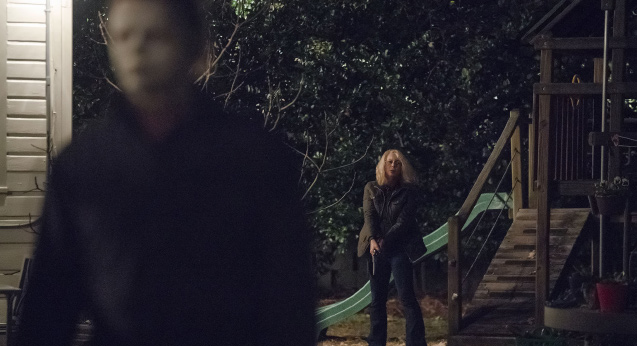
The film has a line about, basically, “What’s scary about a guy that committed a few murders”. How do you go about reminding people that a guy that commits a few murders is still a scary thing in 2018?
Well, I mean, I think a guy who’s committing murders is scary anytime, for any generation, anywhere. I think a murderer is scary, even if they committed one murder.
The outlet that I write for, we are surveying people about the film that most scared them shitless at the moment. For me, the answer to that elegantly titled question is the French version of Martyrs. Can you think of a film that scared you shitless?
The film that scared me the most actually—it had more to do with the age that I was when I saw it than the movie—but it was Friday the 13th.
It’s interesting you bring that up because this is another franchise that you’ve got a strong interest in bringing to the screen.
I would. I would love to do a Friday the 13th movie. I’m waiting until this movie comes out to talk to the right people, but I have a great idea for it, and hopefully, we’ll get to do it.
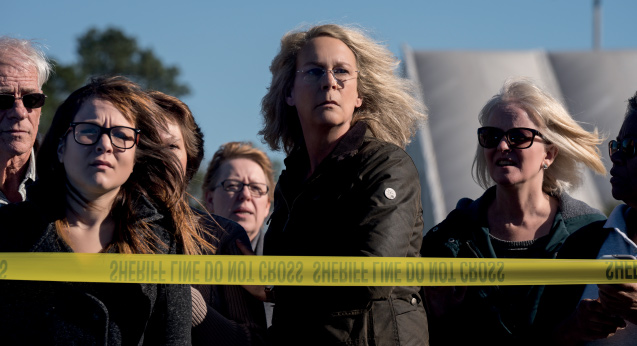
Do you agree that what you’ve managed to do with this is a good advertisement, a good calling card, I suppose, for your ability to walk back into some of these established franchises as opposed to supporting directors with their new ideas?
I would. Well, I like bouncing back and forth between TV and movies because you exercise kind of different parts of the brain, and on the movie side, I like bouncing back between originals and movies in a franchise because again, it’s using very different parts of your creative thinking. So I’m lucky in the ability to do both.
I’ve seen that Danny’s spoken already about possible sequels, and the idea at one point to try and pitch two films back-to-back, and your company has very successfully occupied sequel space with some of its franchises. You must be thinking about doing another film in the Halloween series, yeah?
I’d love to. I’d love to. We have some strong ideas, and a lot of things have to happen for it to be official, but I would certainly love to make another one.

